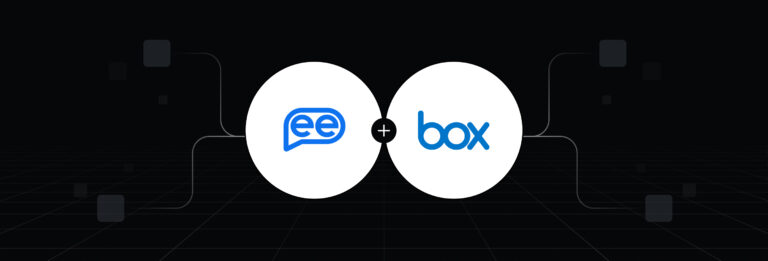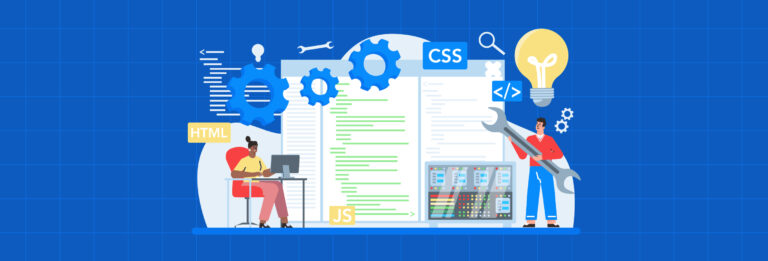Artificial intelligence (AI) was once a thing of science fiction. Fast-forward to 2021, it’s an integral part of most businesses. It has become a revolution that is defining the new-age workplaces. The application of AI is witnessing a massive surge through every profession and industry — human resources (HR) is no exception.
This blog aims to highlight the importance of AI in HR processes and how it is redefining the way the HR department functions.
Role of artificial intelligence in human resource management
According to a report from Gartner, 17% of organizations use AI-based solutions in their HR function, and another 30% will integrate it in 2022. The same study also states that 62% of those that have deployed AI were able to make data-driven HR decisions.
Artificial intelligence is now gaining widespread popularity. Its scope and possibilities are defining new-age paradigms of how businesses must function. Using collected data and predictive analysis, AI enables computers to take productive action. This enables them to think and solve problems like humans. AI comes equipped with high-speed computing capabilities and the ability to churn out huge volumes of data. Its advanced algorithms can make decisions in real-time based on efficient computing technologies and advanced repositories of resources. The addition of AI in HR is transforming employee experience and HR service delivery. Using AI, HR departments can provide an enhanced employee experience and improve productivity.
The HR department handles the entire workforce of the organization. It is also responsible for talent acquisition and productivity optimization. Artificial intelligence can streamline the process by automating data handling and workflows. This allows the HR team to focus more on business, people, and strategy.
According to a 2018 report from Deloitte on Human Capital Trends, the adoption of automation, robotics, and AI is accelerating in the workplace. This is leading to a paradigm shift in working models. The integration of AI is also making organizations more streamlined and sophisticated. HRs can now spend more time on increasing employee satisfaction as repetitive tasks are getting automated.
“The more AI develops, the more fundamental its impact on business and HR. However, I don’t think AI will ever replace people working in Human Resources. They are called ‘human’ for a reason. AI can become a great addition to every department, not a replacement. AI is bound to make the work processes easier for everyone, both HR personnel and all other employees. As a result, it could indeed reduce the attrition rates”
— Ewelina Melon, Head of People at Tidio
How is AI paving the way for HR disruption?
The human resources department is the nerve center of an organization. It handles talent nurturing, onboarding, and undertakes initiatives to ensure that the workforce is productive. The HR department is getting a significant power-up in their efforts using AI in HR. Here’s how AI is paving the way for digital transformation in the HR department:
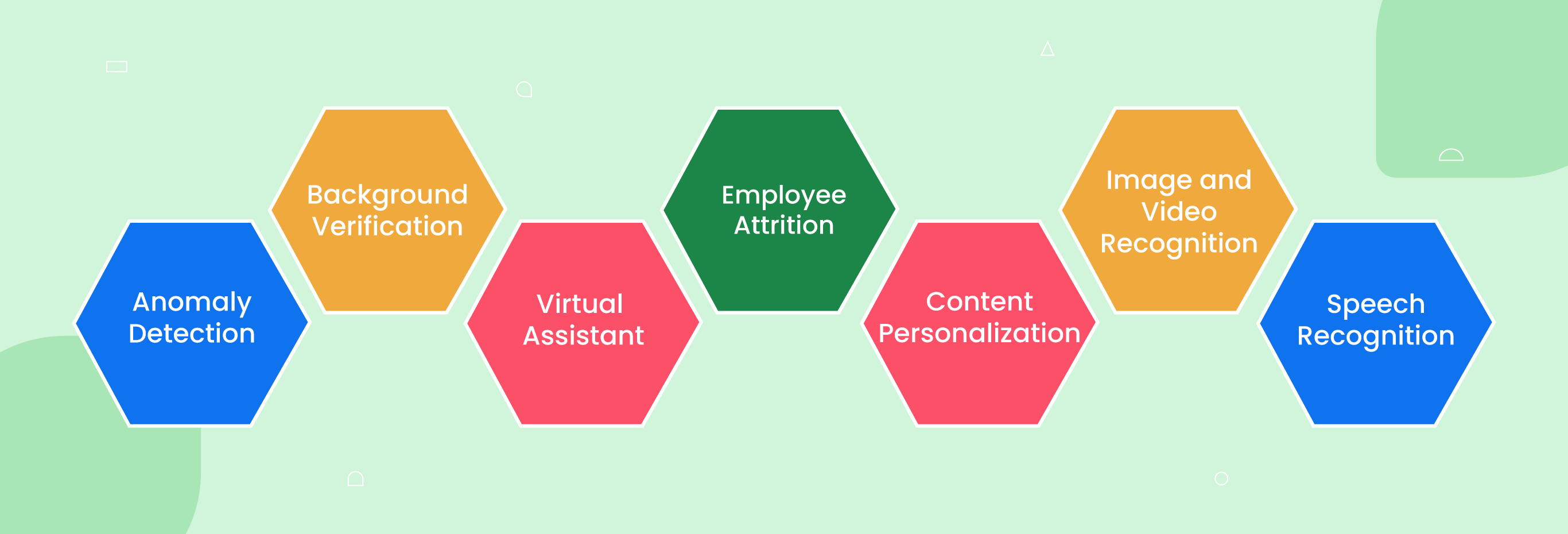
- Anomaly detection – AI helps identify items, events, or observations, which do not conform to usual employee behavior or other items in the dataset.
- Background verification – AI-powered recruitment software can deduce deep insights from resumes and raise red flags based on available data points.
- Virtual assistant – Natural Language Processing (NLP) is the focal point for organizations as AI-powered virtual assistants, and systems that use natural language processing (NLP), It can seamlessly decipher the human language, tone, and context. They can be used to automate HR service delivery.
- Employee attrition – AI-powered HR virtual assistants can engage in constant communication with the employees and narrow down those at a higher risk of attrition. This allows the HR team to take prompt actions.
- Content personalization – AI driven predictive analytics helps in providing a personalized employee experience. They can also recommend career paths and professional development programs.
- Image and video recognition – AI can identify videos and photos of thousands of applicants with a click. They can also classify them based on relevant categories.
- Speech recognition – AI-powered speech recognition systems can identify human voice inputs and respond to employee queries. This can help improve HR delivery and employee satisfaction.
According to a recent survey conducted by Deloitte, almost 80% of the executives rated employee experience as essential for employee retention. Yet, only 22% of them believed that their organization excels at providing a top-notch employee experience. AI-powered virtual HR assistants can increase productivity, gather and analyze data from engagement surveys to offer unique experiences to employees.
Employees are also empowered by AI. They can use intelligent HR case management software powered by AI to raise tickets about their concerns, inquire about company policy on leaves, get updates on the appraisal cycle, and much more.
Is AI in HR the next wave of digital transformation?
HR leaders and managers are certain that technology combined with human prowess will improve human resource processes. Here are the applications of AI in HR in the current landscape:

Recruitment and onboarding
Artificial intelligence is transforming the recruitment process. And, the best example of this can be seen with intelligent forms. With features like auto-parsing, intelligent forms increase the frequency of form completion. This reduces the time HR teams spend on manually scrutinizing applications and makes recruitment easier for both applicants and the organization.
AI in HR is also playing a pivotal role in candidate discovery. Artificial intelligence helps narrow down the best candidates by automating profile analysis and identifying those who may be an ideal fit for the organization. Also, rather than spending time and resources on searching for new candidates, HRs can capitalize on AI to identify eligible employees from the existing database.
Post onboarding, AI helps the recruiters communicate with the HR team at any time of the day and from any location through HR chatbots and remote support applications powered by AI. This reduces administrative costs and ensures that the employees complete the entire onboarding process as per their availability.
“AI can assist the HR department in making more accurate assessments. Hence, you can conduct a screening procedure that focuses more on a candidate’s credentials and relevant work experience. Even more so, AI enhances the screening process by analyzing the applicant’s data and comparing it to other applications. So the HR team can remain assured that their decisions will be made without bias or prejudice.”
— Travis Lindemoen, Managing Director of Nexus IT Group
Internal mobility and employee retention
AI in HR is also facilitating internal mobility and employee retention processes. HRs can now conduct personalized feedback surveys through intelligent employee engagement platforms, gauge employee engagement, and benchmark satisfaction levels more accurately. The surveys can also predict the team’s overall mood and who is more likely to quit. This knowledge allows HRs to immediately take remedial action and lower attrition rates.
Automation of administrative tasks
AI automates repetitive tasks and helps the HR department contribute more time to strategic planning at an organizational level. AI-powered virtual HR assistants can seamlessly automate the following: pre-screening of candidates, scheduling of interviews, employee onboarding, and document management.
According to a study, HR teams that utilized AI performed administrative tasks 19% faster than those using manual workflows. With the time that is saved, the HR department can focus more on ways to unleash the true potential of the workforce.
“AI will unburden HRs by automating planning, talent acquisition and recruitment, recruits’ orientation, training, and improving the working techniques of project leaders. It will also enhance employee experience and engage them more using AI-backed chatbots to keep the conversation going”
— Ryan Yount from LuckLuckGo.
Conversation and employee engagement
AI-powered HR chatbots empower employees and HRs by facilitating smooth communication on all touchpoints. Chatbots over the years have successfully evolved into virtual assistants that engage in natural, human-like personalized conversations. These conversations can be analyzed further to decipher employee sentiments and the needs of specific employees.
“Your HR team can use intelligent conversational assistants to communicate with employees and job seekers in real-time. The AI-powered conversational assistants, in contrast to traditional communication channels, can improve the quality of engagement by providing relevant responses in seconds. Conversational assistants can be further used by your HR team to analyze conversations and determine the needs of the employees”
— Michael Butt, Vice President of Marketing at Verta.ai.
Learning and development programs
Continuous learning and development are integral for the employees and the business to keep growing. The challenge today in a rapidly evolving world is that skills have a low shelf-life. This is where AI in HR can genuinely add value. AI can pave the way for personalized learning pathways augmented to the needs of both the learner and organization.
Artificial intelligence can help the HR department assess the learning styles of each employee and recommend courses based on their style preferences. Carefully tailored content recommendations by AI-powered knowledge management systems supplement the overall career development program and inform the HR team that the candidate is highly engaged with the organization.
HRs can also map the candidate’s career progression and align it to specific skill gaps of a particular project. With deep insights into an employee’s progression, your team can effectively measure what learning will benefit the organization.
HR analytics: What does AI have to offer?
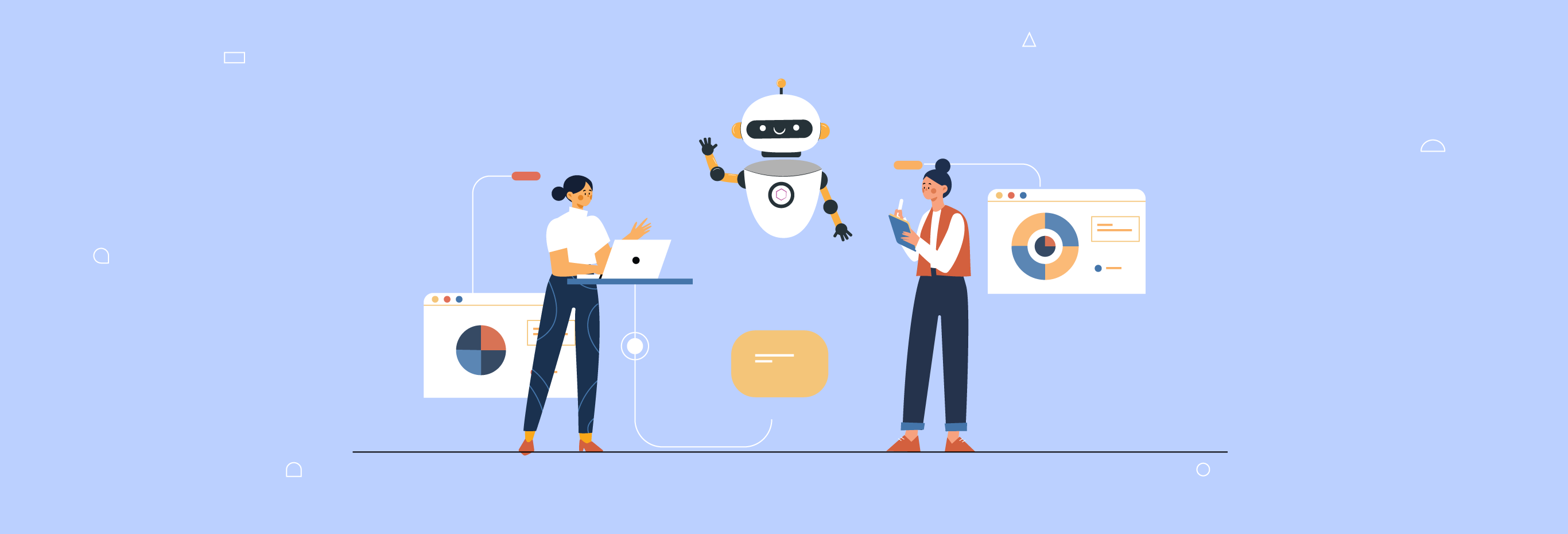
Recruiting skilled talents and maintaining a low attrition rate is the most challenging task for the HR department. The key to achieving this is to ensure that the workforce has a high satisfaction rate. As workplaces continue to evolve, the workforce’s expectations are also changing.
Employees are now accustomed to using technology in their everyday affairs. They expect this to carry over to their workplace. The employees now prefer providing feedback to the management on their terms and not based on the company’s guidelines. The HR teams, therefore, should focus on implementing new systems that enable this.
Here are the top two trends that are continually driving the need for AI in HR:
- The rise of strategic HR – A strategic human resources management (HRM) process requires having a proactive approach in spotting opportunities and avoiding issues in real-time. The focus is to help businesses have the edge over their peers by suggesting innovative talent management techniques and strategies that ensure a high employee satisfaction rate.
- Focus on culture and engagement – Improving the overall work culture is a powerful strategy to improve business outcomes and propel growth. Employee engagement is directly proportional to strong work culture. The stronger the work culture, the easier it is for the employees to understand their performance metrics. Engaged employees are more likely to exceed their goals and remain positive in their work approach.
A robust AI-powered HR system provides in-depth insights so that your team can measure, track data, and ultimately make an informed decision. There are mainly two types of organizational data that your HR team needs to collect and interpret. These are:
- Systems of record – This data throws light on people’s behavior and is mainly collected from human resource management systems, talent management systems, and learning management systems.
- Employee-generated data – This is the data collected directly from the employees through employee engagement surveys.
A data-driven approach enables your HR team to make strategic decisions for retaining quality talent while also improving the overall employee experience. Without AI in HR analytics, HRs will have difficulty understanding an employee’s affinity towards the company and why they are not fully engaged.
The post-pandemic world is witnessing a drastic shift of bargaining power from employers to employees. They are more empowered to ask for higher wages, frequent appraisals, and greater flexibility. The employers’ success navigating this shift heavily relies on the understanding of what employees want from their organization.
A data-first approach can help stakeholders evaluate their business across all levels. It can help them determine the compensation, benefits, appraisals, and salaries for open positions so that the workforce remains engaged and motivated to deliver. Investing time in the HR process, improving workplace diversity, and initiatives is another strategy that can further enhance employee experience.
The HR team has access to data from recruiting efforts, employee growth data, and interview processes. An AI-powered employee engagement software can be instrumental in helping the HR team collect this data and deduce helpful insights from them.
How is artificial intelligence reinventing human resource processes?
The constant need for human intervention is paving the way for AI in HR. The advanced mechanics of artificial intelligence is instrumental in automating two of the most crucial HR processes – HR service delivery and measuring employee engagement. Let’s demystify the role of AI in each of the processes.
AI in HR service delivery
HR service delivery involves managing, responding to, and providing resolutions to employee queries or requests. HR teams generate an enormous amount of knowledge, but most are complex and unique. This results in the need for connecting the dots between the employees and content. Otherwise, HRs will have to repeat versions of the same information for responding to the queries. This kind of manual approach takes days of back-and-forth for a single query to resolve.
HR virtual assistants powered by advanced conversational AI algorithms are successfully transforming how HR teams deliver support. They interpret employee queries and respond to questions from the content repository built by the HR teams.
Whenever an employee raises a query, the HR virtual assistant scans the existing knowledge base to pick a solution that best answers the query. The chatbots being integrated with advanced NLP algorithms also have the innate ability to become more intelligent as they learn from previous experiences.
AI-powered virtual assistants are now playing a pivotal role in helping organizations better consume knowledge by facilitating a seamless interaction with the knowledge bases. The integrated NLP systems make it capable of ingesting and deciphering endless quantities of content without the need for humans to do task classification. The AI working behind the scene builds the categorization to enable interpretation of both structured and unstructured content.
Before AI, whenever employees wanted information regarding company policy or tried accessing the training documents, there was no option other than writing to the HR department. The process was time-consuming and reduced productivity. With the help of AI-backed knowledge management tools connected through messaging systems, the chances of instant solution of the queries are significantly higher.
AI in HR also holds the key to streamlining employee self-service. The right employee self-service experience involves inculcating the feeling that the employees are efficiently and effectively resolving their own challenges. This involves building a ‘Do It Yourself’ culture where the employees can control the process.
Cognitive technologies effectively tap the aspects of work that impact employee experience in a way that is backed by data yet personable. The intelligent algorithms can seamlessly analyze the individual data, conversational cues, and behavioral touch-points to offer a more holistic and efficient self-service experience.
A major drawback of the traditional employee service desk is the manual effort required to raise a query. An AI-powered employee case management system automatically redirects the query to the HR team if it finds no suitable answer in the knowledge base. Once the issue is resolved, the bot automatically marks the ticket as solved and records the details into the database as future reference.
Large enterprises receive thousands of HR requests every month, most of which are similar. Leveraging AI can quickly resolve employee queries and improve HR service delivery, while the team can focus more on contributing towards core business functions.
AI in employee engagement
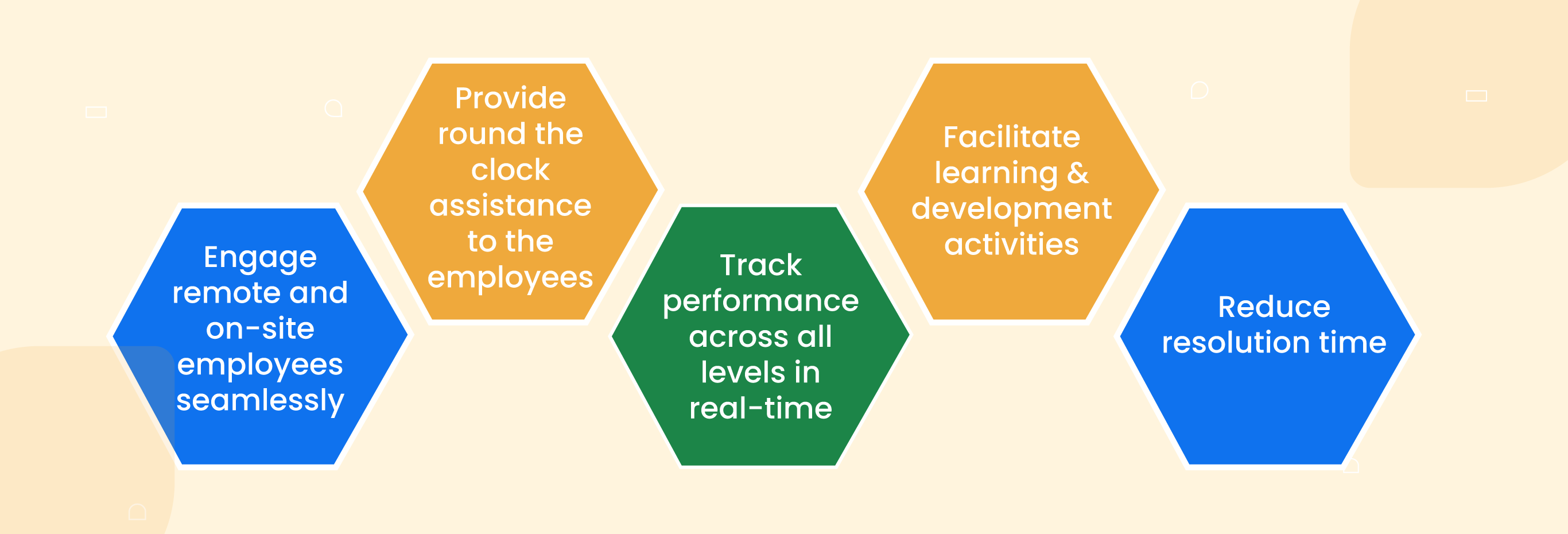
Employee engagement is the measurement of a worker’s enthusiasm and dedication level towards the job. On-the-job surveys, board-room committees, and data analysis could not draw proper conclusions. AI in employee engagement has empowered organizations to effectively track and measure employee engagement levels. Businesses can now:
- Engage remote and on-site employees seamlessly
- Provide round the clock assistance to the employees
- Track performance across all levels in real-time
- Facilitate learning and development activities
- Reduce resolution time
Artificial intelligence is also playing an instrumental role in measuring employee engagement through advanced sentiment analysis. NLP in AI facilitates seamless collection and analysis of employee data from emails and conversations across teams, or employee engagement surveys. The data-driven insights and predictive sentiment analysis can help HR teams appropriately determine employee sentiment and identify red flags. The HR team can take preemptive actions to boost employee interest levels based on these insights.
Let’s try to understand what it means for the organization.
Improved work culture through behavioral data
AI virtual assistants help analyze employee behavior data, which your HR team can utilize for creating a better work culture. The data-backed insights can remove traditional biases and create a neutral work environment where employees will be rewarded based on their performance. By understanding the attitudes and employee behavior, changes can be implemented for promoting a uniform work spirit.
“The future of AI in the HR field is bright because it will improve fairness in all the involved processes by eliminating human bias. This issue has been impossible to solve since, at times, the bias happens unconsciously. Bias has largely limited the objective of HR which is to recruit top talent. However, thanks to artificial intelligence, this will be a thing of the past”
— Scott, CEO, and co-founder, Hicollectors.
Capturing employees’ daily experiences in real-time
AI provides in-depth insights into the general mood of employees, overall satisfaction rate, and their relationship with their colleagues and reporting managers. The advanced algorithms can flag any difficulty or challenges the employees face in the workplace.
The HR team can gain insights from pulse surveys administered to employees. The surveys are pivotal in tracking employee mood and overall dedication of the employees. The HR team can also gain insights into employees’ thought patterns, including employees’ desire to quit. These data-backed insights can help HRs create personalized responses to prevent exits.
Quick intervention process for solving engagement issues
The traditional system of annually assessing an employee’s professional satisfaction may not always be appropriate. AI in HR can analyze the employee’s communication patterns in real-time and perform sentiment analysis to gauge their state of mind. When combined with predictive analysis, these insights highlight the overall engagement level and enable HRs to take steps in real-time to solve engagement issues, reduce the overall attrition rate, and boost productivity.
“We can use AI to help human resources make talent recruitment judgments, predictions, early warning of resignation intentions, and take appropriate counter-measures. With the help of HR information system, many companies’ human resources can indeed automate many processable matters and improve their working efficiency.”
— Jesse Thé, president & CEO of Tauria.
Skill development through focused learning
AI-powered HR analytics can help management develop personalized, structured training programs for employees across all levels. Aligning training programs with an employee’s personality and learning quotient can help achieve a higher level of correlation among learning, efficiency, and engagement.
Enhancement in-team collaboration efforts
Higher efficiency across teams can be achieved by creating team structures and hierarchies considering individual skills and abilities. Predictive data analysis can seamlessly identify employees who can work together and drive engagement owing to a collaborative work environment. AI can effectively analyze work patterns and help HRs create teams where individual skills and behavior will help the organization reach greater heights.
AI and HR automation: What does the future hold?
AI is playing a defining role in HR by automating repetitive, mundane tasks and enabling them to focus more on decision-making and strategy. Here’s how AI will shape the future:
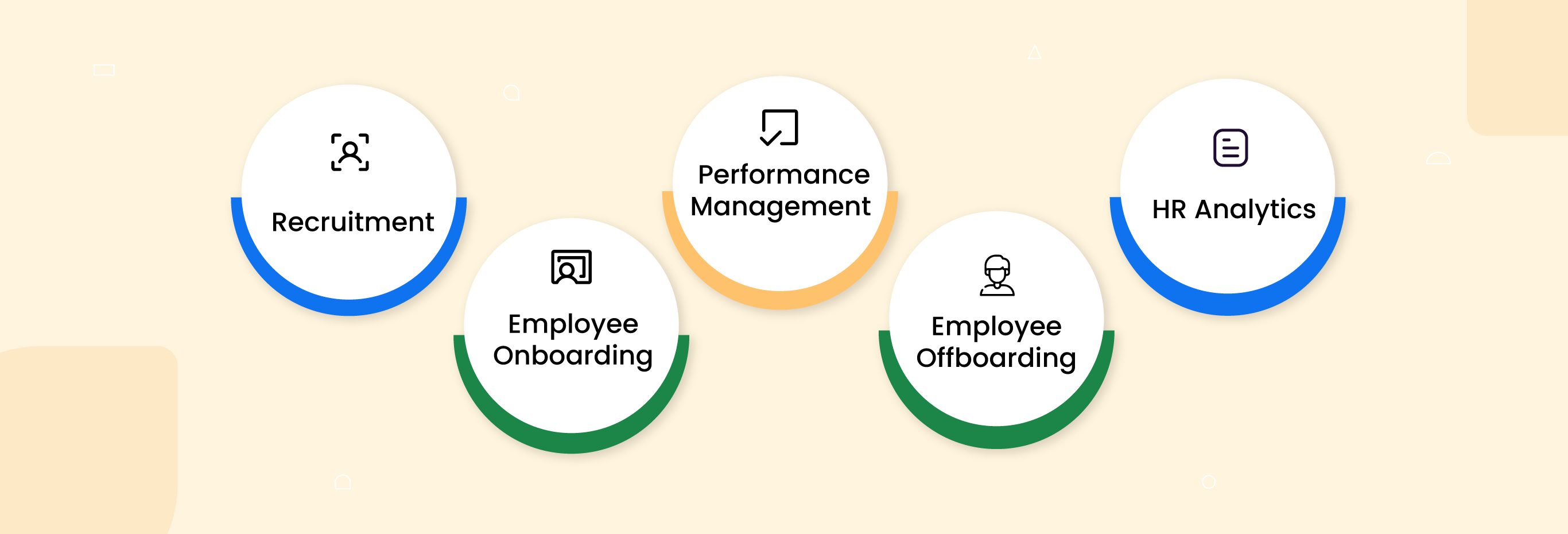
Recruitment
Scrutinizing job applications is a routine task for HRs. Automation will help them leverage AI for narrowing down the most suitable job applications. This can save a lot of time which they can utilize on tasks that require strategic decision making.
Employee onboarding
Onboarding involves a lot of paperwork. HR automation will play a pivotal role in employee onboarding automation, reducing the processing time to a few hours from weeks.
Performance management
Maintaining employee performance records by collecting feedback from supervisors and evaluating KPIs is a time-consuming task. HR automation systems will help managers keep track of the overall performance of the team. In case of low performance, the smart algorithms will send automated alerts and action plans defined by their team leads.
Employee offboarding
When an employee decides to quit, it is essential to ensure a smooth offboarding process. This includes processing the necessary documents and removing the credentials from the database. Smart offboarding automation systems will help build a standardized and automated workflow for this process, helping in avoiding disputes and strengthening employer-employee relations.
HR analytics
HR departments deal with large quantities of data. Maintaining employee data and deriving meaningful insights out of those is an arduous task. HR automation will automatically gather employee data and correlate them with KPI measures to provide powerful insights to the HR department concerning employee performance and engagement levels.
As AI evolves, virtual assistants will become more empowered to decipher human languages and engage in conversations to solve employee queries. They will have access to a broader knowledge base, which will enable them to solve more complicated employee queries.
Artificial intelligence will also strengthen HR analytics by seamlessly gathering complex candidate data from recruitment, conversation, and biometric information. This will enable HR teams to provide a personalized onboarding, learning, and offboarding experience. Employee engagement will remain a crucial aspect that will heavily rely on AI Chatbots.
HR leaders and managers will aggressively adopt HR virtual assistants to reduce resolution times. AI-powered HR case management systems will also take charge and help deliver an unmatched level of employee experience, improving the overall efficiency and productivity of the employees.
Multiply organizational efficiency with Leena AI
Powered with advanced AI algorithms, Leena AI has been successfully paving the way for AI in HR. You can seamlessly integrate Leena AI into your existing ecosystem and automate HR and employee workflows as per the business needs.
The suite of applications derives meaningful HR analytics to help businesses improve HR service delivery and ensure high levels of employee engagement. With Leena AI, you can also automate responding to routine employee queries and provide them with the flexibility to raise a ticket about their concerns on the go.
You can even build a central repository of your HR policies and FAQs, which your team can access and update at any time. The power-packed NLP abilities allow the advanced virtual assistant to decipher complex human queries and quickly respond in human languages. This reduces the resolution time drastically and contributes to the overall organizational efficiency.
Want to speak with our experts?
Schedule a demo todayBringing it all together
The multitude of benefits of artificial intelligence is leading to the rapid adoption of AI in human resources across industries. The most arduous tasks, often considered dull or repetitive, can now be successfully managed by AI in HR, reducing time and error while improving efficiency.
The upside for HR professionals is that the disruption brought about by AI in automating repetitive tasks helps them focus more on strategic business operations. The insights provided by collecting and analyzing employee data help them take preemptive action and ensure high employee satisfaction and low attrition.
To put things into perspective, AI in HR is a revolution that is successfully improving the overall employee experience, automating service delivery, reducing resolution times, increasing productivity, and decreasing operational costs.
Frequently Asked Questions
What does AI mean in HR?
AI in HR refers to integrating artificial intelligence in human resource processes. The inclusion of AI is expected to help organizations perform at their peak because it can empower HR teams with data-driven insights and help them make informed decisions. AI can be successfully embedded in recruitment, onboarding, HR service delivery, and tracking performance and employee engagement.
What is the impact of artificial intelligence on HR?
AI in HR is successfully automating repetitive tasks, unburdening HR teams from time-consuming tasks, and improving efficiency. This allows the HR team to focus more on strategic business operations and contribute to the overall growth of the business. Moreover, employees often have a myriad of questions concerning their leaves and appraisals. AI-powered HR case management software automates replies to repeated queries, reducing the average resolution time significantly.
What is HR intelligence?
HR intelligence refers to a proactive and systematic process for gathering, analyzing, communicating, and utilizing insightful results and analytics to help the HR team achieve its strategic objectives. This refers to gathering and analyzing data from engagement surveys and delivering in-depth insights to organizations so that they can make informed decisions with reliable information.
Is AI the future of HR?
It’s unlikely that AI in HR will completely replace humans. A successful HR ecosystem in the future will comprise the right mix of AI, analytics, and human intervention. Data-driven insights will help HR professionals automate onboarding new workers, conducting engagement surveys, answering repeated queries, processing payroll, and tracking employee attendance. This will help them focus more on strategic business activities and contribute to the overall growth.
Should HR be automated?
Automating HR processes streamlines workflows, ensures processes are compliant with company policies, and reduces the likelihood of error. This helps businesses save both time and resources and improve the overall productivity of the HR department.



